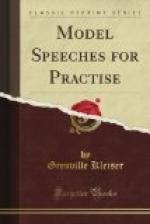MODEL SPEECHES FOR PRACTISE
AFTER-DINNER SPEAKING
BY JAMES RUSSELL LOWELL
My Lord Coleridge, My Lords, Ladies and Gentlemen:—I confess that my mind was a little relieved when I found that the toast to which I am to respond rolled three gentlemen, Cerberus-like into one, and when I saw Science pulling impatiently at the leash on my left, and Art on my right, and that therefore the responsibility of only a third part of the acknowledgment has fallen to me. You, my lord, have alluded to the difficulties of after-dinner oratory. I must say that I am one of those who feel them more keenly the more after-dinner speeches I make. There are a great many difficulties in the way, and there are three principal ones, I think. The first is having too much to say, so that the words, hurrying to escape, bear down and trample out the life of each other. The second is when, having nothing to say, we are expected to fill a void in the minds of our hearers. And I think the third, and most formidable, is the necessity of following a speaker who is sure to say all the things you meant to say, and better than you, so that we are tempted to exclaim, with the old grammarian, “Hang these fellows, who have said all our good things before us!”
Now the Fourth of July has several times been alluded to, and I believe it is generally thought that on that anniversary the spirit of a certain bird known to heraldic ornithologists—and I believe to them alone—as the spread eagle, enters into every American’s breast, and compels him, whether he will or no, to pour forth a flood of national self-laudation. This, I say, is the general superstition, and I hope that a few words of mine may serve in some sort to correct it. I ask you, if there is any other people who have confined their national self-laudation to one day in the year. I may be allowed to make one remark as a personal experience. Fortune had willed it that I should see as many—perhaps more—cities and manners of men as Ulysses; and I have observed one general fact, and that is, that the adjectival epithet which is prefixt to all the virtues is invariably the epithet which geographically describes the country that I am in. For instance, not to take any real name, if I am in the kingdom of Lilliput, I hear of the Lilliputian virtues. I hear courage, I hear common sense, and I hear political wisdom called by that name. If I cross to the neighboring Republic Blefusca—for since Swift’s time it has become a Republic—I hear all these virtues suddenly qualified as Blefuscan.




